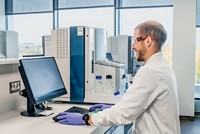Advertisement
Grab your lab coat. Let's get started
Welcome!
Welcome!
Create an account below to get 6 C&EN articles per month, receive newsletters and more - all free.
It seems this is your first time logging in online. Please enter the following information to continue.
As an ACS member you automatically get access to this site. All we need is few more details to create your reading experience.
Not you? Sign in with a different account.
Not you? Sign in with a different account.
ERROR 1
ERROR 1
ERROR 2
ERROR 2
ERROR 2
ERROR 2
ERROR 2
Password and Confirm password must match.
If you have an ACS member number, please enter it here so we can link this account to your membership. (optional)
ERROR 2
ACS values your privacy. By submitting your information, you are gaining access to C&EN and subscribing to our weekly newsletter. We use the information you provide to make your reading experience better, and we will never sell your data to third party members.
Drug Discovery
Artificial intelligence investment booms in drug discovery field
Year starts with two financing wins and a spate of partnerships
by Rick Mullin
January 9, 2019
| A version of this story appeared in
Volume 97, Issue 2

The year has started with a flurry of activity in computational drug discovery and development, including two financing wins and a raft of new partnerships.
Molecular simulation software specialist Schrödinger received $85 million in financing to help develop its computational platform for drug discovery. Schrödinger, a cofounder of Nimbus Therapeutics and Morphic Therapeutic, says it plans to add scientists to its own drug discovery team. The financing round was led by the Bill and Melinda Gates Foundation Trust and WuXi AppTec’s corporate venture fund.
Exscientia scored $26 million in funding to accelerate development of artificial intelligence (AI) applications in drug discovery and advance its own drug candidates to the clinic. Funding comes from Evotec, a previous investor, as well as Celgene and GT Healthcare Capital Partners.
Numerate, which applies AI to drug discovery, announced a pact with Lundbeck Pharmaceutical to identify clinical candidates for the treatment of central nervous system disorders. Insilico Medicine, an AI-based company studying age-related disease, debuted a collaboration with TARA Biosystems, which markets a “heart-on-a-chip” tissue model for risk assessment in drug discovery. They will work on therapies for cardiac disease.
1st Biotherapeutics, which is focused on neurodegenerative diseases, immuno-oncology, and orphan diseases, struck a deal with AI-driven twoXAR on therapies for glioblastoma. And Recursion, which combines AI and automation with biology in drug discovery and development, said Takeda Pharmaceuticals has exercised an option to develop drug candidates targeting two rare diseases. The companies say they have worked for 18 months evaluating Takeda molecules in more than 60 indications.
The new partnerships and financing may point to a sustained increase in AI-oriented investment in the year ahead, but analysts caution that the technology is still finding its level in the data-swamped drug discovery lab. “There are plenty of opportunities for AI to improve decision support,” says Michael H. Elliott, CEO of Atrium Research & Consulting. “But the fundamental problem always comes down to how we are capturing the data, how we are managing the data.”



Join the conversation
Contact the reporter
Submit a Letter to the Editor for publication
Engage with us on Twitter